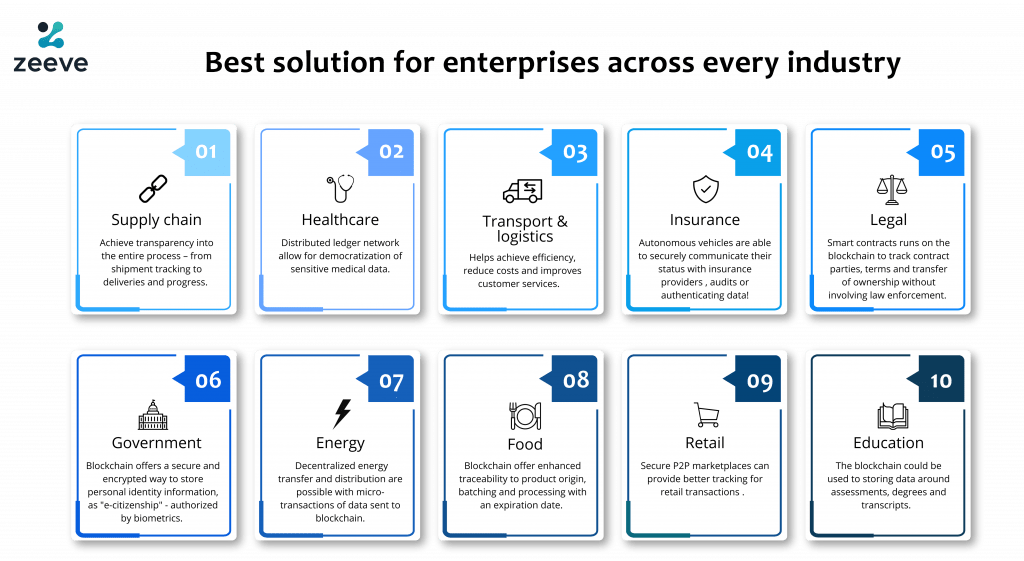The potential for blockchain technology like Blockchain for Enterprise is unparalleled in its ability to solve complex, costly problems. This blog gives us an informative and eye-opening overview of how this budding field has started helping enterprises find solutions by providing more efficient ways than ever before!
Blockchain technology for Enterprise – its potential
The 2009 launch of Bitcoin made headlines but it also eclipsed the underlying technology – blockchain. Blockchain for Enterprise is a game-changer. It’s the next-generation database technology with unique features that will allow us all to store our information more efficiently and securely than ever before!
With its advent, we can now look forward to a new era of groundbreaking blockchain applications. This fledgling technology has many real-world uses, showcasing how it can prove to be a disruptive force for organizations and businesses across the world willing to explore how this distributed ledger technology actually works.
Since the time of its introduction, revolutionary blockchain technology has moved from being just a theoretical concept to more a disruptive solution to handle real-world complex problems. Organizations have shown eager interest to test its applications.
Accelerated adoption of blockchain for enterprise applications
Blockchain is touted as the future of the global economy and the interest around it is increasing exponentially. Leaders in technology, finance & business are investing heavily into “Blockchain for Enterprise” initiatives that aim at changing our world forever by providing new solutions for problems like trust management or identity verification systems which will revolutionize many aspects of life as we know them today!
It has been employed by big-name companies like Amazon, the United States Postal Service (USPS), and even Facebook in order to improve their existing processes, streamline work, reduce costs or enable new business models! With support from blue-chip companies such as IBM, Microsoft, and Bank of America, this new technology is gaining more traction over the recent years. In fact, it is not just the biggies but small businesses across the board are also taking a keen interest in this revolutionary technology that has the potential to transform their industry and give them an edge over competitors with new tools for doing business that was never before possible.
Invest in Blockchain for Enterprise for a competitive edge
Blockchain technology is a powerful tool that can help facilitate transactions and the exchange of data among different parties without anyone entity having complete control over how it works.
Around 80% of companies see blockchain technology as a strategic priority, while others might resist its arrival but they are missing out on potential opportunities! The bottom line is, many aspects of this technology are due for mass implementation in various industries across different sectors – if you’re not already on board then now may just prove to be an ideal time to take advantage of pioneering blockchain for enterprise applications.
Businesses unprepared for the rapid development of blockchain are most likely to face a challenging and uncertain future. However, those who can foresee how this revolutionary blockchain for enterprise applications helps in preserving security and scaling up their operations would be able to compete more effectively with its implementation.
There are multiple advantages for businesses to deploy blockchain for enterprise applications- whether using its public blockchain network or resorting to private or permissioned blockchain-based applications.
Ø Trust
Blockchain is an ingenious technology that enables trust among parties who would otherwise have no relationship at all. Parties involved in a transaction are able to exchange data or make payments without the need to establish personal relationships or have any kind of information about one another beforehand. Cryptocurrencies are a perfect example of how blockchain can help you securely and transparently trade your goods with others.
Ø Decentralized structure
Blockchain, with its decentralized nature, is a great way for businesses to share data without any single party being in charge. This means that the system can be more secure because it has multiple copies of all relevant information and no one entity has sole control over it. The need for information sharing is essential in the modern-day business world. For example, businesses within supply chains are at risk without being able to share what they know with other stakeholders along this line of commerce who have a stakeholder-related interest or involvement. No single entity controls all that happens in the supply chain, from production to distribution or even retail sales – which means some form of collaboration between different parties is needed at every step for success.
ØEnhanced security and privacy
Blockchain is a revolutionary way to store and exchange information, with its end-to-end encryption preventing fraud and unauthorized activity. The new system can better protect your privacy than traditional computer systems by anonymously data-mining and requiring permissions for access.
Ø Optmizes costs
Blockchain for Enterprise has the potential to be an incredible cost-saving tool for businesses. It eliminates middlemen who traditionally have provided processing services — such as vendors and third-party providers.
Ø Speed
Blockchain can process transactions significantly faster than conventional methods by way of eliminating intermediaries and replacing manual processes in transactions.
Ø Visibility and traceability
Taking a closer look at the potential benefits of blockchain, analysts have found that it could help track everything from medicine to organic products. The rise in usage of this technology has revolutionized the way that retailers like Walmart manage their inventory, respond to problems or questions and confirm histories of merchandise.
Ø Immutability
The immutability of blockchain is a major selling point because it ensures that transactions can’t be changed or deleted. The Blockchain is the most secure way to store information because of its timestamps and date stamps and so there’s no chance for fraud! This makes them perfect when you need to track information over time – enabling an accurate audit through security measures such as encryption techniques
Streamline operations and improve efficiency with block chain-based solutions
A major reason for the success of blockchain comes from being able to share sensitive information securely with ease and also streamline operations. The blockchain is an innovative ledger with a data format that makes it stand out from other types of databases by providing secure, immutable information and also reducing manual tasks. In contrast to traditional databases, blockchain stores all information in blocks that are linked together and protected by cryptography to protect it from tampering or hacking, making blockchain more secure. The technology’s unique features address problems in our systems and processes, making it a powerful tool for any organization looking at streamlining its operations or scaling up efficiencies.
A blockchain is a powerful tool for organizations across industries looking to streamline their operations. The technology’s ability reduces the need for manual tasks and eases reporting and auditing make it an efficient investment that will pay off in cost savings.
From tracking inventory to executing contracts, blockchain removes the need for third-party involvement which means faster and more efficient transactions!
Blockchain technology is a powerful tool for businesses because it eliminates the need to reconcile documents like billing statements and invoices, which can have major impacts on cash flow. For example, insurance providers rely heavily upon reimbursements from customers; however, with blockchain, this process will be made instantaneously instead of waiting days or weeks at times before receiving payment back as well any other risks involved inefficiencies such as regulatory bodies who may inspect your records while also being exposed themselves if there were data breaches.
Implementation steps for a blockchain-based solution
The ubiquitous nature of blockchain technology and its increased proliferation has prompted more companies to implement actualized projects. To help you get started with your own implementation process, we have compiled a few steps that can apply across industries:
- Start off with identification of a use case: The first step to implementing blockchain into your company is identifying a use case. You have to study, clarify and arrange your needs accordingly so that they can be met through digital solutions such as Blockchain! It is important to narrow down the use cases you would like for your blockchain before implementing it. This is important to make sure that the process goes smoothly and without any complications.
- Create PoC: The next in line is to create a valid Proof of Concept (PoC) which will help determine how feasible your blockchain implementation would be in terms with this business model! There is a rigid planning that precedes its creation. Consider certain relevant questions such as the purpose of the project, how Proof-Of Concept will help me learn about certain aspects in order to make better decisions for future projects or client engagements.
- Choosing a blockchain platform: Selecting the right blockchain platform for your business is the most strategic step. Making the right choice of platform entails consideration of factors such as your business needs, working model, budget and thorough research. You can choose from any of the popular blockchain platforms such as Ethereum, Stellar, Corda, Quorum and Multichain among others.
- Testing: It is the most practical step of blockchain enterprise solution implementation. This is where we make sure our plan will work for the next step. We take a small section of data and see how it goes, then strategize about what comes after that based on this success or failure.
- Roll out: The last stage of the implementation cycle is a full-scale roll out. This requires commitment and patience, as it will take time for all earlier stages to complete before reaching this point in order to make sure everything works smoothly when released onto open source platforms. One has to be prepared to face uncertainties during roll-out and also follow up with the revision of regulations and practices as and when needed. Bug fixing is an essential part of staying true to the required standards.
Challenges for enterprises when switching to blockchain technology
Experts have identified some of the risks and challenges with blockchain that need to be overcome for it to become widespread in society.
With blockchain, companies are able to make significant changes at low costs. However many organizations believe it cannot yet deliver high enough returns for them personally or as a business investment. Hence, this could hold up adoption rates in industries where they are most needed.
Blockchain may be the way of tomorrow, but it cannot function on its own. It needs to integrate with other systems and processes for verification purposes before adding data onto a blockchain ledger system. Without this verification system in place – relying only upon suppliers confirming taxes were paid without any external confirmation–the value dies out quickly.
Blockchain is a system of recording and tracking information, but there’s no way to confirm the accuracy. That means we need checks in place so that any lies can be discovered before they cause major problems for business.
With its decentralized nature, there are fears that enterprise uses might require some central control to ensure protocols aren’t being broken or abused in any way. The burning question is as to who will address breaches in security, trust, and protocols.
Blockchain use cases in real-world industries
The potential for blockchain is endless. A recent study found that it can be used in many different industries, including the following:

Supply chain: Blockchain facilitates a secure and transparent method for transferring data that allows you to see everything from suppliers all along your supply chain, giving companies more insight into their inventory levels as well as who should be getting what they need at any given time – without interference or tampering!
Banking and Finance – Blockchain technology is making waves in the finance industry. Cryptocurrency has gained credibility as an alternative form of payment, and DeFi emerging to replace processes handled by banks such as credit card transactions or investing your money with them for interest rates on loans they provide you that may not be available elsewhere. The use cases are still being discovered but it looks promising!
Healthcare: The potential of blockchain in healthcare is immense. It could bring about a number of innovations including improving pharmaceutical research and making it easier to transmit electronic medical records, all while maintaining privacy for patients’ personal data!
Blockchain could make the government more efficient and transparent by providing a way for citizens to transmit their personal information electronically, vote online or acquire passports. It’s also possible that blockchain will help us with the preparation of our documents such as mortgage deeds or financial reports!
How Zeeve can help businesses get started with a blockchain based solution
Zeeve is the fastest, easiest way to launch and manage your blockchain nodes. With Zeeve you save up to 97% of time & 60% in costs compared with manual deployment solutions. It will help you build your blockchain app fast.
The new SAAS platform allows companies of all sizes to create their own Blockchain apps quickly with just one click on the interface!
By hiring the services of Zeeve and using its tools, your company can experience seamless CI/CD pipeline management. Zeeve will streamline workflows with Git or any other source control system that you use for managing projects in this way- it’s never been easier to collaborate on code between teams working remotely!
Zeeve transform Enterprise ecosystem with its solution
Zeeve can deploy, manage blockchain nodes and networks seamlessly for institutions in every possible industry. It aims to leverage the unique characteristics of blockchain technology and fully realize its potential in major industries like energy, food safety, and supply chain management is already being observed. The blockchain technological capabilities have armed Zeeve to set up blockchain-based applications and solutions that are capable of changing the way enterprises do business across all sectors from finance, healthcare, supply chain, insurance to retail. With its superior blockchain management support systems, the company will help businesses to cut down transaction costs through improved efficiency or security and also deploy identity verification solutions that allow users to access services more quickly than ever before while protecting them against cyberattacks at every turn.
Key Takeaways
Leaders from different sectors have begun exploring how blockchain might be able to improve their workflows–from shipping acres off certificates instead onto digital ledgers; ensuring food safety by tracking everything through an app that updates itself automatically without any human intervention whatsoever(ii); streamlining transactions with just one click when you buy something online.
Businesses that fail to explore the potential of blockchain technology could be left at a disadvantage when competing against other businesses that have already started implementing these improvements.
The recent rise in popularity and applicability for use cases show how much disruption this new tech can potentially cause if not properly utilized by companies seeking innovation opportunities with their business models.





